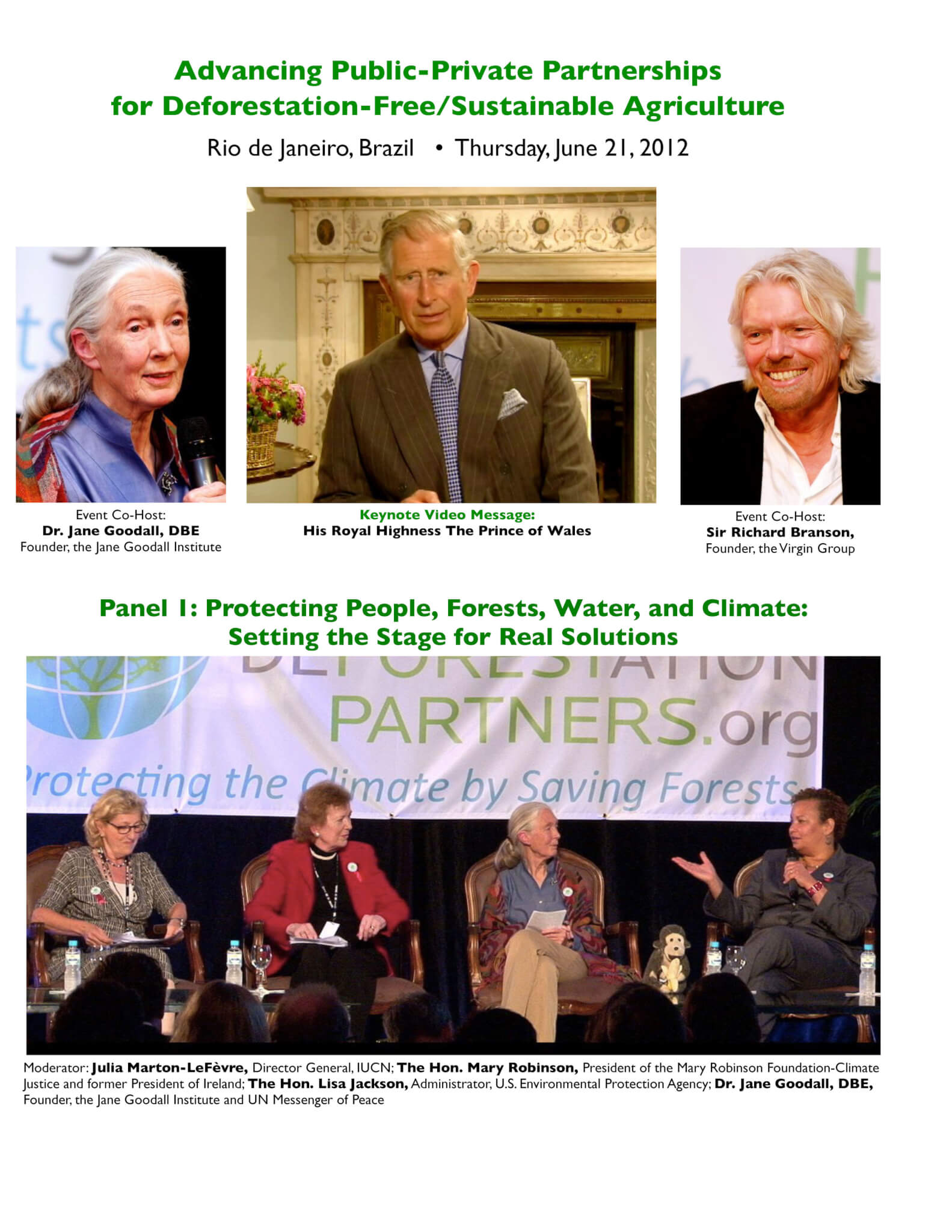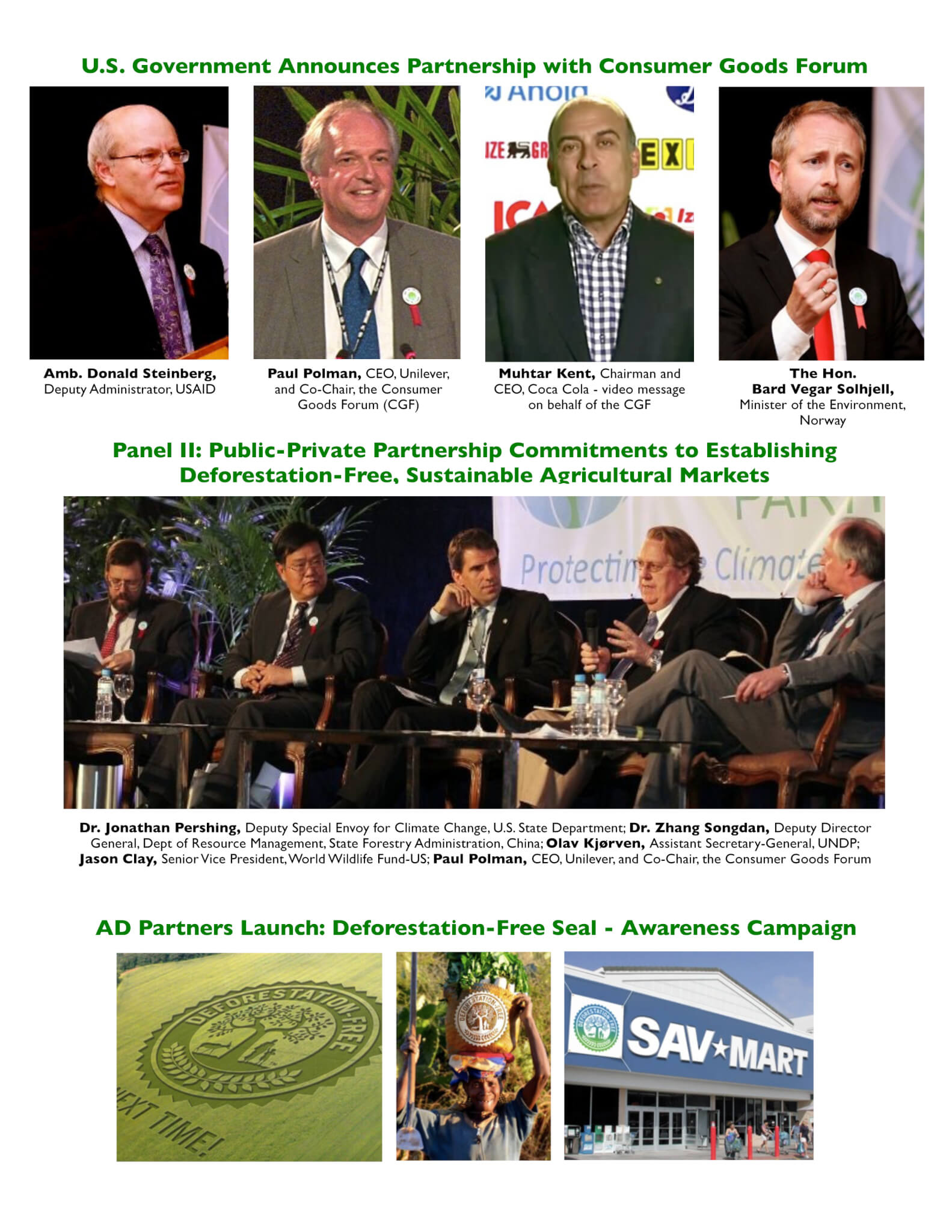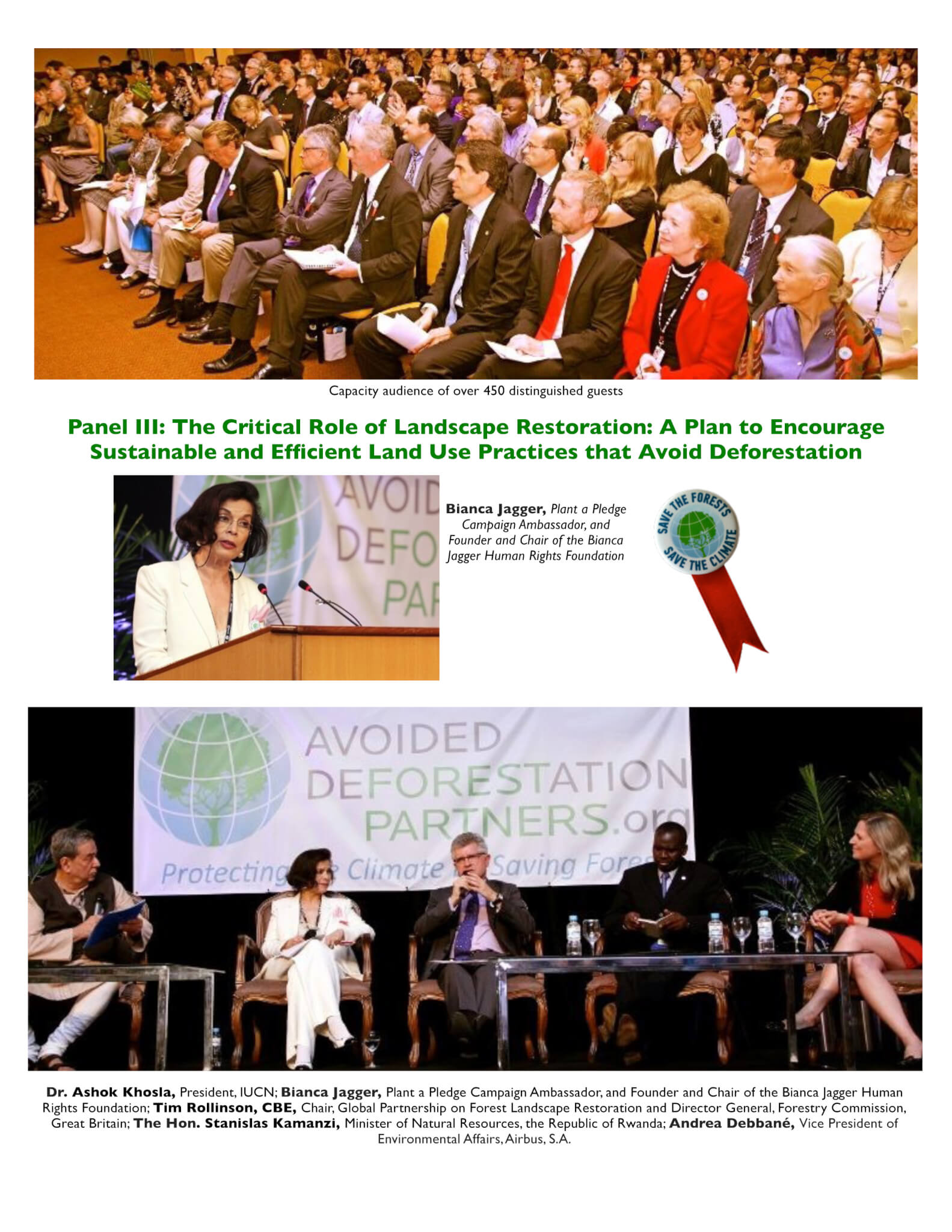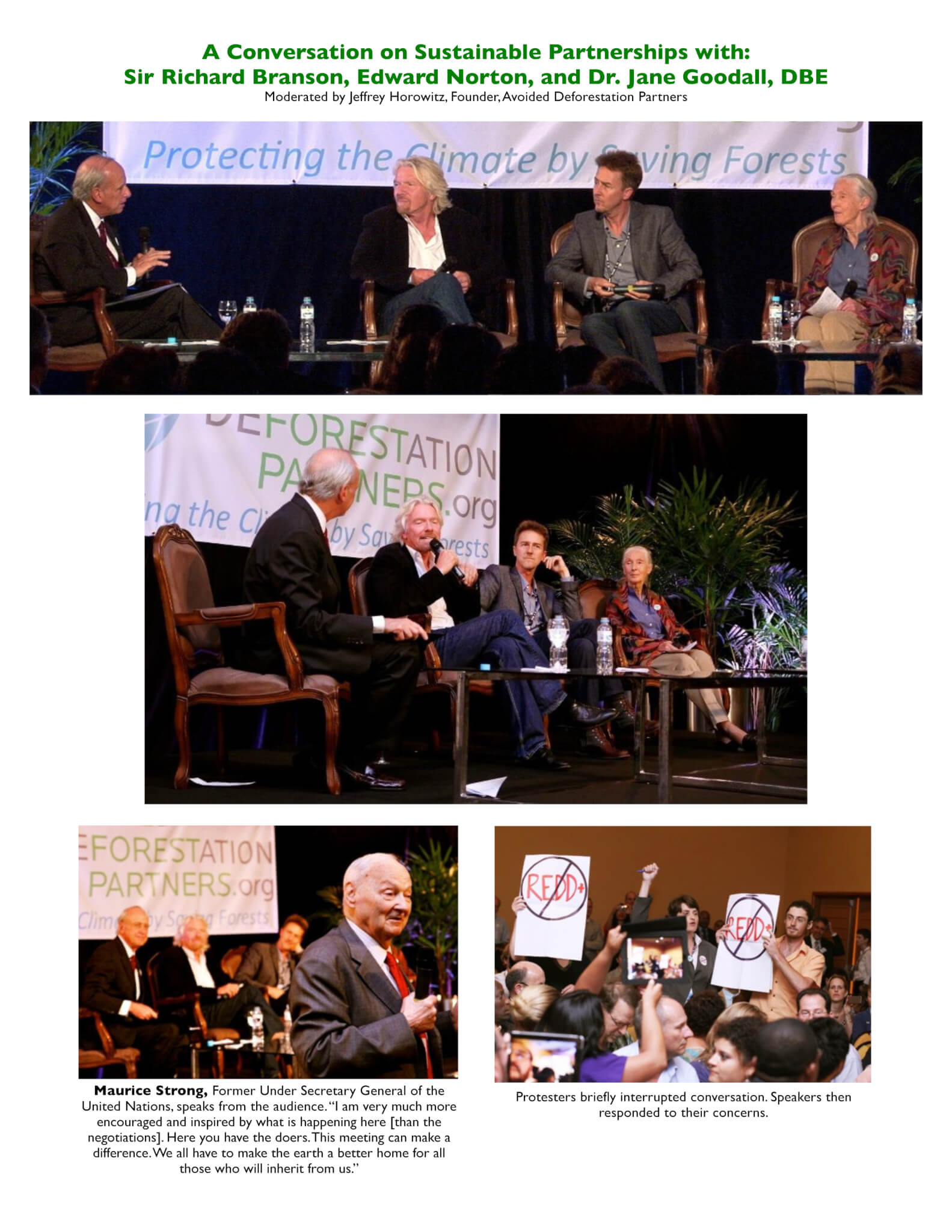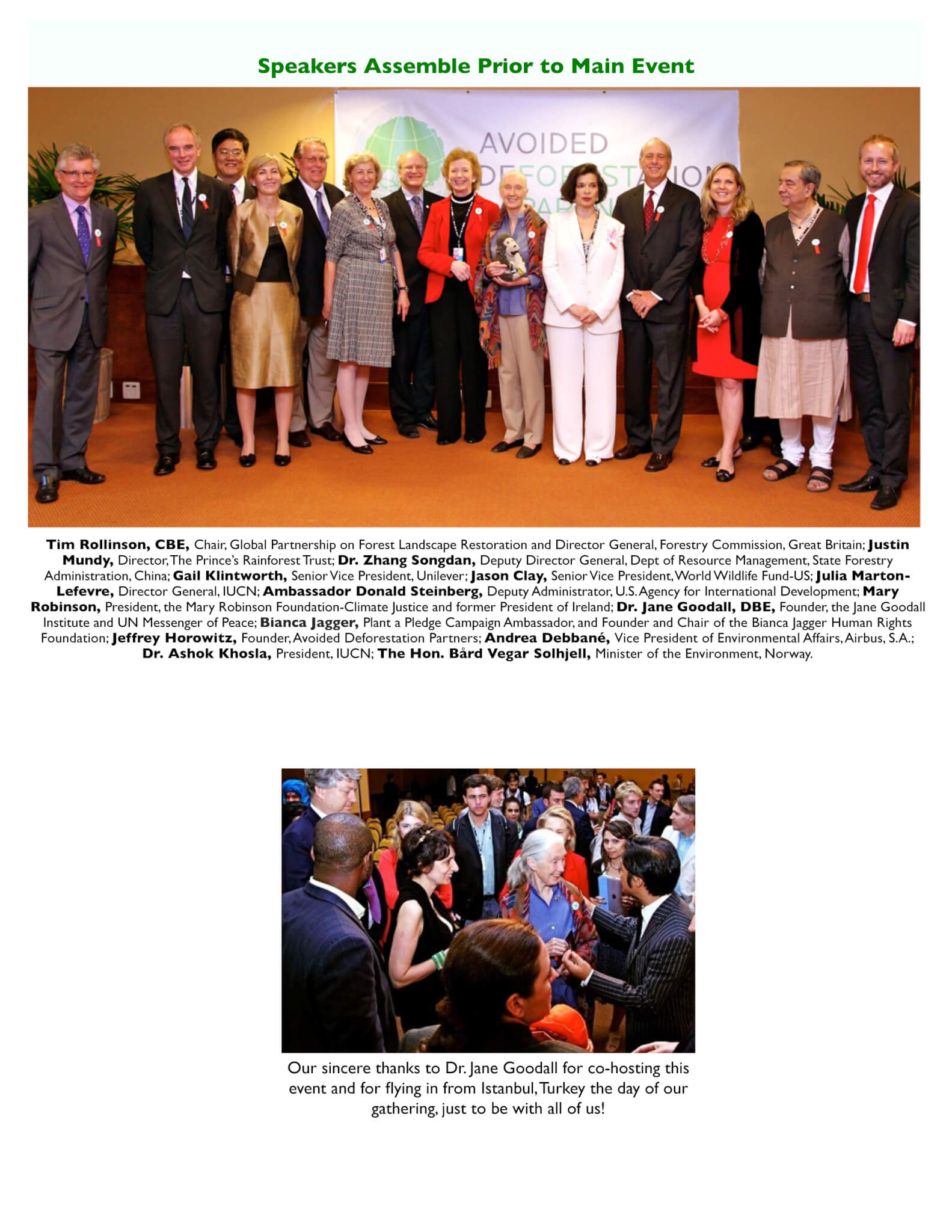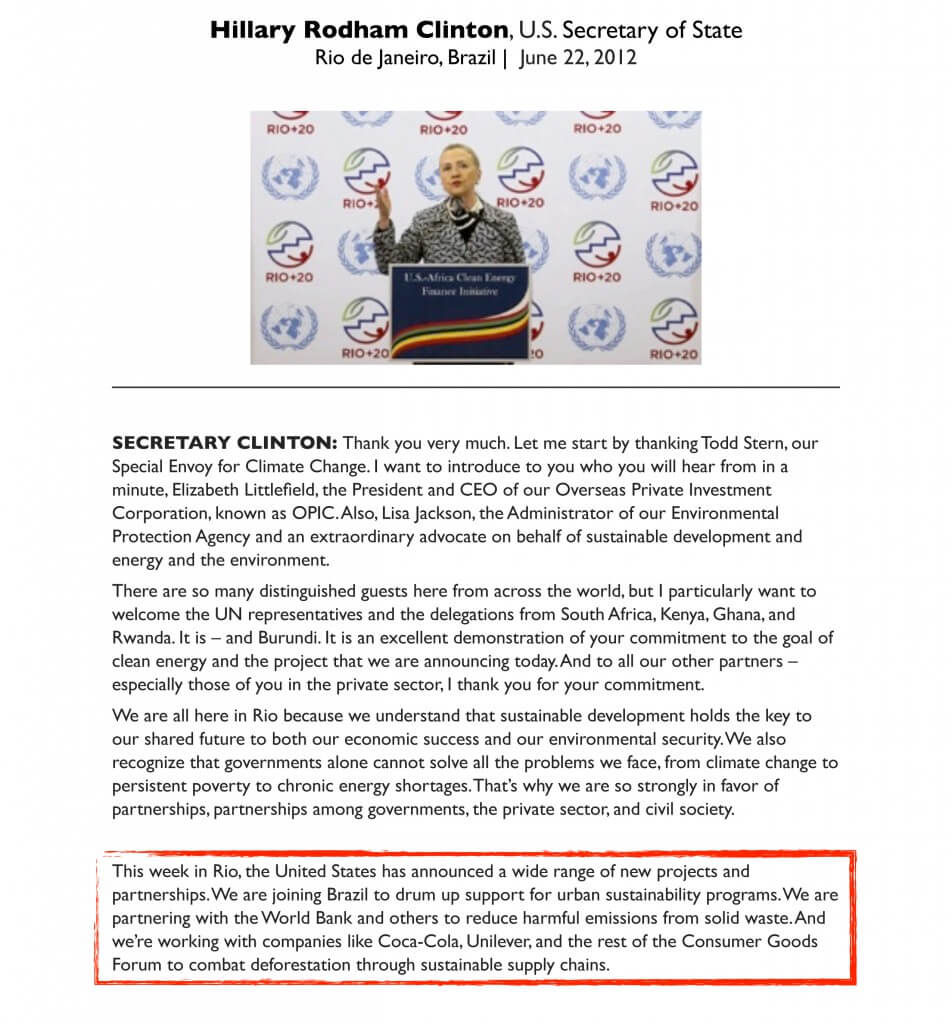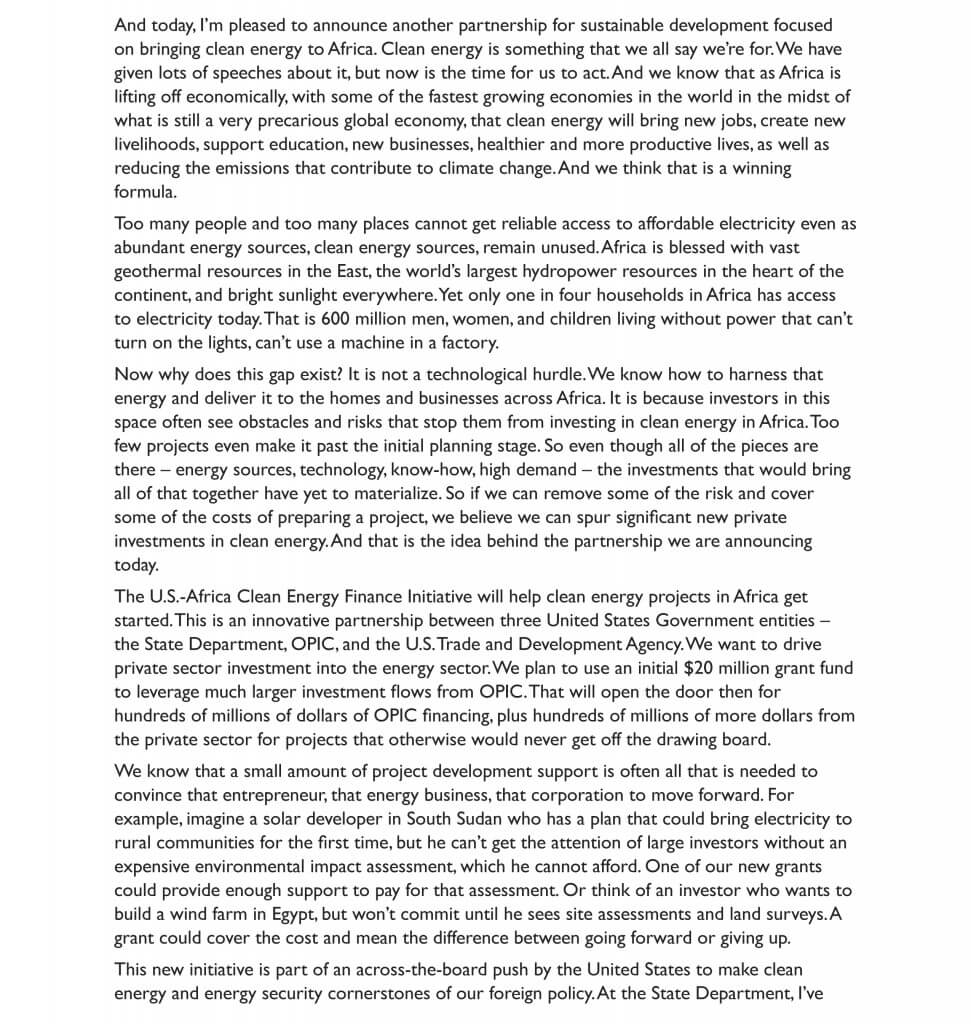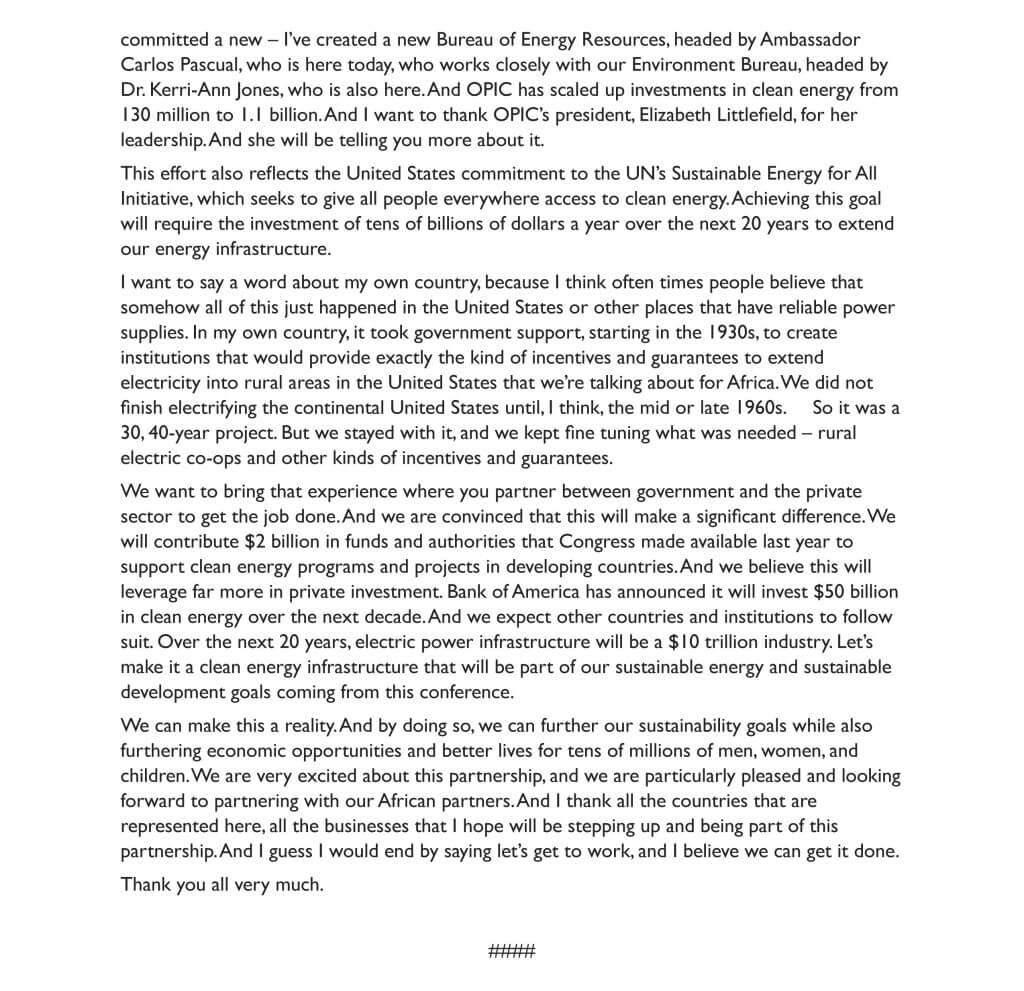News and Events
ADP Rio+20 Event Co-Hosted by Dr. Jane Goodall & Sir Richard Branson
AD Partners is pleased to have brokered an important strategic alliance between the U.S. Government and the Consumer Goods Forum (CGF), an organization representing 400 leading CEOs with $3.1 trillion in commodities. As industry leaders, the CGF understands that resource depletion is a looming concern that will pose a threat to all of us, given our planet’s finite agricultural land, forests and water.
In particular, they realize the enormous value of saving our vanishing tropical forests. To help protect against environmental degradation and cost increases due to limited resources, the CGF has pledged that their supply chains for agriculturally-based commodities will be sustainable and free of deforestation by 2020.
But companies cannot go it alone, as Muhtar Kent, CEO of Coca-Cola, and Chair of the Consumer Goods Forum put it at the AD Partners event. For the CGF to meet their ambitious goal, it will “require close, close collaboration across the golden triangle of business, government, and civil society.”
Since agriculture is a key driver of deforestation, this pledge will send a strong signal to suppliers that continuing on the path of forest destruction is unacceptable – a powerful signal that is good news for people, wildlife, natural resources and our climate.
Event Summary
Amid skepticism that much would be accomplished during the 20th anniversary of the Earth Summit in Rio de Janeiro, Avoided Deforestation Partners convened a group of extraordinary people from all walks of life — government officials, CEOs, scientists and NGO leaders — to discuss innovative pathways to protect forests while providing food, fiber and fuel for a growing global population. In particular, the event focused on the urgent need to transform agricultural practices in ways that benefit farmers and provide for local communities, as well as protect forests.
His Royal Highness The Prince of Wales opened the proceedings via a special video message. “If the pace of the negotiations and the speed with which agreements are implemented is too slow…we have no option but to forge ahead by taking action now,” he said. Focusing on the dual problems of food security and deforestation, he recommended “tackling the problem in coordinated way” and “reshaping consumption patterns, so that we align them in a far more far-sighted way with the very real constraints of our planetary boundaries.”
Dr. Jane Goodall, DBE, Founder of the Jane Goodall Institute and UN Messenger of Peace, followed Prince Charles’s remarks, and emphasized that deforestation is often due to poverty and growing populations that limited land cannot support. She reminded those of us who do not live in or depend upon forests how much our unsustainable lifestyles contribute to deforestation, driving mining, oil and agricultural companies into forested areas and leaving destruction and poverty in their wake. But she also struck a hopeful tone, acknowledging that some companies are realizing that if they continue with business-as-usual, it will lead to catastrophe, and that it is “immensely encouraging” that several big corporations are beginning to put their weight behind doing things differently.
The event featured three substantive panels, each of which provided lively discussion on a variety of initiatives to reduce deforestation. The first panel brought together three distinguished leaders: Mary Robinson, President of the Mary Robinson Foundation – Climate Justice and former President of Ireland; Administrator Lisa Jackson, head of the U.S. Environmental Agency and Cabinet member in the Obama Administration; and Dr. Goodall. The panel was moderated by Julia Marton-LeFèvre, Director General of the IUCN.
Both Mary Robinson and Lisa Jackson talked about “climate justice” and the need to expand the climate change conversation so that the needs of the poorest are front and center, including access to energy, food, and adequate attention to health concerns. They advocated the development of environmental policies that respond to those needs. Julia Marton-Lefèvre asked why market forces undervalue ecosystems and how the private sector can be enlisted to encourage nature-based solutions, and said she was encouraged that such solutions now appear to be of interest beyond the conservation community. Dr. Goodall also suggested that not only are consumers becoming more aware of how the choices they make affect the environment, but companies such as Stonyfield Farm and Patagonia are also developing ethical values. Administrator Jackson said government should be supportive of companies that make sustainability part of their objectives, that government standards should set a floor, not a ceiling. In in some cases, she noted, government should simply “get out of the way” and not be an impediment to such moves by the private sector.
The second panel was led by four keynote speakers. The first, USAID’s Deputy Administrator, Ambassador Donald Steinberg, announced that the U.S. Government and companies of the Consumer Goods Forum are forming a new partnership to work together to reduce deforestation by “greening the supply chain” and, within 100 days, would hold a global partnership dialogue.
“With all due respect to my colleagues who have been in the room negotiating…I don’t think these are side events, this is the main event,” he said to applause from the audience. On the need to create partnerships he added that, “no international organization, no government, no NGO, has a monopoly on financial resources, on good ideas, on ground truth or on moral authority.” On behalf of the U.S. Government, he invited other countries, companies, and civil society leaders to join the effort to develop joint policy recommendations as well as an action plan to promote sustainable food production, while also protecting and conserving forests.
The Consumer Goods Forum, representing more than 400 companies and brands operating with combined annual revenues of over US$3.1 trillion, has pledged to achieve zero net deforestation in their supply chains by 2020. Muhtar Kent, Chairman and CEO of Coca-Cola, was in Istanbul for the CGF’s annual meeting, but joined the event by video. He reiterated the Forum’s commitment to eliminate deforestation from their supply chain, in particular for commodities such as soy, palm oil, paper and beef. “About half of the world’s deforestation is now fueled by these four commodities,” he said, adding that, “with the right incentives, however, we believe that farmers can meet future demand without chopping down another tree.”
Paul Polman, CEO of Unilever and Co-Chairman of the Consumer Goods Forum, followed. He stated that, “there is no stronger signal than the signal from the marketplace.” Polman added that, “it is completely unacceptable that 950 million people go to bed hungry, that two and a half billion people do not have access to hygiene and water, and that [the global population] uses one and a half times the world’s resources — and this is before two billion more people will come into this world and aspire to have the standard of living we’ve become accustomed to.”
Polman went on to say that, “Someone calculated that if we don’t do something about climatechange by 2050, the entire profit of the consumer goods industry would be wiped out…Nowthat should wake you up at night… So what we said at Unilever was very simple. Instead ofhaving the regular business view of how can we use society and the environment to besuccessful, why don’t we turn that around and create a business model that says how can we give to society and the environment to be successful and create a totally climate neutral model.”
Norway’s Minister of Environment, Bård Vegar Solhjell, spoke of his personal travels in Central Kalimantan and the Amazon, and how these experiences reinforced his need to act quickly to solve climate change. He emphasized how important forests are to carbon storage, biodiversity, rainfall, and as part of our natural capital. “We should pay communities and countries for doing us the service of protecting rainforests,” he said to applause. He added that Norway aims for an international financing mechanism to mobilize funds to increase demand for REDD+ results, and “in this way countries will know there will be payments to be received for the service they provide when they value standing trees.”
U.S. Deputy Special Envoy for Climate Change, Jonathan Pershing, then facilitated a panel discussion of public-private partnerships. “About one billion people suffer from chronic hunger. That’s a stunning number. And, over the next 50 years we will need a 60-70 percent growth in the quantity of food, which leads to an inescapable conclusion that we need to do better, we need to be more efficient and manage the system more carefully. Solutions will be complicated, and require partnerships,” he said to open up the discussion.
Dr. Zhang Songdan, Deputy Director General of China’s State Forestry Administration, Department of Resource Management talked about China’s efforts to increase its forest area. This includes protecting 95 million hectares of natural forests and returning nine million hectares of agricultural lands back to forests while increasing agricultural production overall, which he called remarkable progress for China. “Agriculture and forests are mutually beneficial if dealt with properly,” he said, adding that, “we very much care about deforestation not only inside China, but also in foreign countries. We ask our companies to abide by local laws if they do business abroad.”
Olav Kjørven, Assistant Secretary-General for UNDP, discussed the need for not only the right market signals, but also good governance. He reminded the audience of the need to insure that there are land rights in place so that communities can use their local resources wisely, and use the tools of law to defend their rights. Olav emphasized the need to work at all levels to build capacity and put in place incentives that change behavior.
Jason Clay, Senior Vice President of World Wildlife Fund-US cautioned that, “from Rio toRio+20, the market value of natural capital, biodiversity and ecosystem services has arguably gone down, while the value of commodities has gone up. We have to mind the gap.” He spoke about the need to create demand for sustainable products, increase productivity and efficiency, improve practices on the ground, reduce waste, and rehabilitate degraded lands. Finally, here cognized a key role of government to “move the bottom” 10-20 percent of companies that cause 30-50 percent of environmental impacts.
Paul Polman closed out the panel, saying that when he became CEO, he was warned to “stay away from Ben and Jerry because they are radicals,” adding “but we need those people —otherwise, you don’t move the boundaries and that is desperately needed.” He said Unilever can’t do it alone and wants to help create a critical mass. “Companies need to understand that they need to become active participants in the system that gives them life, and not bystanders. That means providing solutions to some of the challenges.”
Dr. Ashok Khosla, President of IUCN, led the final panel with the statistic that two billion hectares of land need to be restored, and reminded the audience that though “avoided deforestation” is not a silver bullet, returning degraded lands back to forests that provide ecosystem services, or productive uses, is also an important part of the solution.
Bianca Jagger, Plant a Pledge Campaign Ambassador and Founder and Chair of the Bianca Jagger Human Rights Foundation, spoke about the Plant a Pledge campaign, an initiative created to support the Bonn challenge to restore 150 million hectares of land by 2020, which is “the largest restoration campaign the world has ever seen.” She talked about the recent announcement to restore 18 million hectares of land, 15 million of which was pledged by the U.S. Department of Agriculture.
Tim Rollinson, Chair of the Global Partnership on Forest Landscape Restoration and Director General, Forestry Commission, Great Britain, asked: Why are we not restoring the damage that we’ve created? “We have two billion hectares of degraded land. This is a source of shame for all of us. This is also a moment in our time when we can do something about this. We can put back the ecosystem services that we’ve lost and are so critically important,” he said.
The Hon. Stanislas Kamanzi, Minister of Natural Resources for the Republic of Rwanda, talked about how his country is committed to the campaign to restore lands and ecosystems —despite the pressures of population growth and subsistence agriculture. “We need to keep our landscapes green, presently, but also for future generations to come.” He also spoke about the importance of the private sector, particularly because 70% of forests are privately owned in Rwanda, and the environment the government is trying to create for positive investment.
“Good business has to be a sustainable business,” said Andrea Debbané, Vice President of Environmental Affairs for Airbus, S.A. “Aviation today contributes two percent of man-made emissions. The industry has goals of reaching by 2020 carbon neutral growth, and by 2050 to reduce our emissions by half. And that’s quite a challenge. Fuel efficiency is at the heart of our business. We’re considering new sources of energy and looking at sustainable biofuels is really key. We are looking at value chain projects, including using wasteland and turning it into productive land.”
For many, the highlight of the event was a conversation between Richard Branson, Founder, the Virgin Group, Edward Norton, actor, environmentalist and UN Goodwill Ambassador for Biodiversity, and Dr. Goodall. The three shared personal experiences of the impacts of climate change — from the last remaining forests of Madagascar, the Maasai wilderness in Kenya, to Gombe National Park in Tanzania —and how spending time or working in these countries with local people has inspired them to make conservation a passion.
After saying that governments and social organizations have played their role and done their best, Richard stressed the point that, “The one imperative is…we’ve got to get every single business in the world and every single business man and every single entrepreneur to play their role… if we do this, we can get on top of the world’s problems. I feel very fortunate to be in a position where I feel I can make a small difference, and I’m not going to waste that position.”
Norton agreed, adding that, “The most important part of the partnership chain is local capacity.…One thing the U.S. has done well is in providing seed capital for start-ups, which haslet to unbelievable productivity. This approach needs to be taken to tackle global problems, where the start-ups are at the community-based level.” He also praised the Equator prize, saying that, “there needs to be one million versions of [this] prize.”
Dr. Goodall spoke about the hope she drew from the incredible response to her Roots and Shoots program, which inspires young people in 130 countries – more than 17,000 active groups. Roots and Shoots is built on the philosophy that “every single individual person makes a difference.”
Ed Norton closed his remarks by saying, “This moment is very dire, this is a legacy moment. If we fail [to solve climate change], people [in the future] are going to think we were a collective winner of the Darwin award and really marvel at our stupidity.” He struck a hopeful note, however, and spoke to the speed with which technology is moving and his fundamental faith that we have the “juice” to get ahead of the destruction we’ve caused, “But we do have to resolve ourselves to get it done,” he said. Norton praised the new captains of industry, such as Richard Branson, for beginning to recognize the value of our natural capital.
Toward the end of the program, Maurice Strong, former Under Secretary-General of the United Nations and the Secretary General of the 1992 Rio Earth Summit, very graciously said, “I learning more by listening to people who are actually doing things. I am very much more encouraged and inspired by what is happening here [than the negotiations]. Here you have the doers. This meeting can make a difference. We all have to make the earth a better home for all those who will inherit from us.”
back to topAgenda
Rio+20 Earth Summit
Advancing Public-Private Partnerships for
Deforestation-Free / Sustainable Agriculture
The Windsor Barra Hotel
Thursday, June 21, 2012 from 2:00 – 5:00 pm
A G E N D A
Welcoming remarks:
Jeff Horowitz – founder, Avoided Deforestation Partners
Special Video Message:
His Royal Highness The Prince of Wales
Keynote Remarks from event co-chair:
Dr. Jane Goodall, DBE – Founder, the Jane Goodall Institute and UN Messenger of Peace
Perspectives on the Rio+20 Earth Summit:
Maurice Strong – Former Under-Secretary General of the United Nations
* * * * * * *
Main Program
I. Protecting People, Forests, Water, and Climate: Setting the Stage for Real Solutions
Moderator: Julia Marton-LeFèvre – Director General, IUCN
1. The Hon. Mary Robinson – President of The Mary Robinson Foundation-Climate Justice and former President of Ireland
2. The Hon. Lisa Jackson – Administrator, U.S. Environmental Protection Agency
3. Dr. Jane Goodall, DBE – Founder, the Jane Goodall Institute and UN Messenger of Peace
II. Public-Private Partnership Commitments to Establishing Deforestation-Free, Sustainable Agricultural Markets
Video Address: Muhtar Kent – Chairman and CEO, Coca Cola, on behalf of the CEOs of the Consumer Goods Forum
Remarks by: Paul Polman – CEO, Unilever and Co-Chair, Consumer Goods Forum
Remarks by: The Hon. Bård Vegar Solhjell – Minister of the Environment, Norway
Moderator: Jonathan Pershing – Deputy Special Envoy For Climate Change, State Department, United States
1. Dr. Zhang Songdan – Deputy Director General, Dept of Resource Management, State Forestry Administration, China
2. Olav Kjørven – Assistant Secretary-General, United Nations Development Programme
3. Jason Clay – Senior Vice President, World Wildlife Fund-US
4. Paul Polman – CEO, Unilever and Co-Chair, Consumer Goods Forum
Video Presentation by Avoided Deforestation Partners:
“Imagine a World that is Deforestation-Free”
III. The Critical Role of Landscape Restoration: A Plan to Encourage Sustainable and Efficient Land Use Practices that Avoid Deforestation
Remarks by: Bianca Jagger – Plant a Pledge Campaign Ambassador, and Founder and
Chair of the Bianca Jagger Human Rights Foundation
1. Tim Rollinson, CBE – Chair, Global Partnership on Forest Landscape Restoration and Director General, Forestry Commission, Great Britain
2. The Hon. Stanislas Kamanzi – Minister of Natural Resources, The Republic of Rwanda
3. Andrea Debbané – Vice President of Environmental Affairs, Airbus, S.A.
Short Film by John Liu, narrated by Dr. Jane Goodall, DBE “Restoring the Earth”
IV. A New Era of Cooperation: Public-Private Partnerships for Protecting People, Forests and Biodiversity
Facilitated by: Jeff Horowitz – Founder, Avoided Deforestation Partners with
Sir Richard Branson – Founder, Virgin Group
Edward Norton – Actor, environmental activist and UN Goodwill Ambassador for Biodiversity
Dr. Jane Goodall, DBE – Founder, the Jane Goodall Institute and UN Messenger of Peace
News Release
RIO DE JANEIRO – The United States Government announced it would partner with companies of the Consumer Goods Forum, representing more than 400 companies and brands operating with combined annual revenues of over US$3.1 trillion, to support the Forum’s pledge to achieve zero net deforestation in their supply chains by 2020. The announcement was made at an event sponsored by non-profit Avoided Deforestation Partners on the margins of the Rio+20 summit.
Donald Steinberg, Deputy Administrator of USAID announced the US Government would co-host, alongside companies of the Consumer Goods Forum, a high-level Partnership Dialogue in Washington DC within 100 days that focused on promoting sustainable agriculture that protects forests. “No one company, NGO, or government has a monopoly on good ideas or can solve the problem of deforestation alone,” Steinberg said.
Lisa Jackson, Administrator of the US Environmental Protection Agency and alternate head of the United States delegation to the Rio+20 summit said she applauded the commitment made by companies of the Consumer Goods Forum and was pleased to see the development of this new partnership with the US Government.
“Individually both governments and business have already mobilized significant resources to address the challenge of deforestation but we all recognize that much more can be achieved if we align our efforts and work in partnership,” said Paul Polman, CEO of Unilever.
The Consumer Goods Forum is meeting concurrently in Istanbul this week. Muhtar Kent, CEO of Coca-cola, was in Istanbul but joined the event by video and reiterated the Forum’s commitment to eliminate deforestation from their supply chain, in particular for commodities such as soy, palm oil, paper and beef-responsible for half of the world’s deforestation, he said.
The US Government invited other countries, companies, and civil society leaders to join the effort to develop joint policy recommendations and an action plan to promote sustainable food production, while also protecting and conserving forests.
“I am so pleased to see the United States Government and major companies beginning to take a leadership role in protecting the environment. We environmentalists can only do so much. It truly takes all of us working together to heal the planet,” said Jane Goodall, co-Chair of the event.
“The private sector needs to put people and the planet at the center of all we do,” said Richard Branson, CEO of the Virgin Group. “Together we need to face critical challenges, including finding ways to harness and protect our natural assets-including the last remaining tropical forests. The planet won’t wait.”
Ted Turner, entrepreneur, philanthropist, and the second largest landowner in the United States, also voiced support. “The message of this event is very timely. Our land-based resources are dwindling, and so we must be responsible stewards by reducing wasteful consumption and agricultural practices and promoting sustainable uses that protect the environment while continuing to feed growing populations,” he said.
Jeff Horowitz, founder of Avoided Deforestation Partners who organized the event was “extremely pleased to see governments and corporations make such extraordinary commitments”. He added, “We believe this partnership can be a game changer with the potential to transform how we grow our food, fuel and fiber, with immediate and dramatic effects on efforts to slow, halt and reverse deforestation.”
About an acre of tropical rainforests are lost every second. The clearing and burning of these forests are responsible for approximately 15 percent of global carbon emissions. The event featured people from all walks of life-CEOs, scientists, high-level government officials, and NGO leaders-discussing the urgent need to transform agricultural practices in ways that benefit the environment and farmers while allowing consumers to avoid contributing to climate change in their daily purchases.
Toward the end of the program, Maurice Strong, former Under Secretary-General of the United Nations and the Secretary General of the 1992 Rio Earth Summit, very graciously said, “I learning more by listening to people who are actually doing things. I am very much more encouraged and inspired by what is happening here [than the negotiations]. Here you have the doers. This meeting can make a difference. We all have to make the earth a better home for all those who will inherit from us.”
back to top

